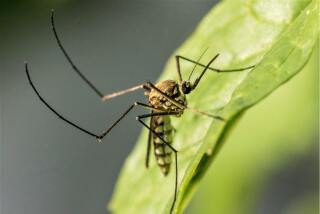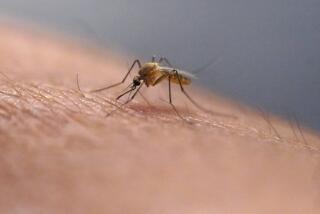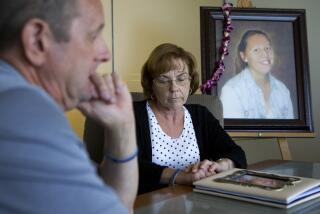‘They Would Have Told His Family, Right?’ No
- Share via
County health officials say they were just following the rules. If so, they need some new rules. Or, to borrow a word from the 9/11 commission, how about a little “imagination” when it comes to identifying public health threats? If imagination is too much to ask for, how about a little compassion? Common sense?
Health officials held a news conference Thursday and told the world that a 57-year-old man was the first in the state to die of the West Nile virus.
Clinical in the extreme, they said the death underscored how serious the threat was and that we could expect more deaths in the state. They told us the man had preexisting health problems. They reminded us to be on guard against mosquitoes, which can carry the virus.
They forgot only one key thing: to tell James Damiano’s family that he was the person they were talking about.
And so it was left to reporters, who arrived at Damiano’s identity by piecing together public records, to lay the truth of his death at his brother’s doorstep. After they inquired, Joseph Damiano called his brother’s doctor, who confirmed that West Nile was the culprit.
To show you how badly this was handled, here are Joseph Damiano’s first few remarks to a Times reporter who contacted him about the possibility of his brother being the victim: “I don’t believe it’s him. That would be amazing to me. If anything, they would have told his family, right?”
You would think so.
Damiano said he’d read newspaper accounts of the West Nile victim -- having no idea it was his brother -- who died June 24. Instead, Damiano has been telling friends and relatives that his brother died of heart, kidney and respiratory failure.
Tests confirming that West Nile led to his death weren’t complete until the middle of last week. Health officials made the announcement the next day, without bothering to ensure that Damiano’s family had been notified.
Some of you may be asking whether this is 20/20 hindsight. If so, ask how you’d feel if you were watching TV or reading about a man who died of a dangerous disease and nobody told you it was your brother.
I’m left to conclude that in their by-the-numbers rush to inform the public, health officials forgot the simplest touch of all: the human touch.
Is it really unfair to ask whether the Damiano family couldn’t have been informed that he was going to be the subject of a news conference and a statewide story?
This is the kind of oversight that gives bureaucracies a bad name. In the worst sense, it’s the kind of thing that defines them.
After The Times helped Joseph Damiano determine that his brother was the West Nile victim, health officials said privacy rules prevented them from naming him and that it was the responsibility of his doctor or the hospital. Well, before holding a news conference, how about a phone call to his doctor, alerting him to give the family a heads-up before cameras roll?
As it turned out, the announcement sounded vaguely like our national terror threats. We’re told of a threat, but given no details.
They didn’t tell us he lived in an assisted-living facility or anything about his activities. Could that have been helpful information to others at the facility? Or to the public at large?
I can’t say I know the answers to those questions, but it leaves me with no more information than it left you: West Nile can be fatal. That we already knew.
I can say one thing with certainty: There’s something really wrong when you’re reading the paper about a death from a public menace -- but have no idea it’s your brother.
Dana Parsons’ column appears Wednesdays, Fridays and Sundays. He can be reached at (714) 966-7821 or at dana.parsons@latimes.com. An archive of his recent columns is at www.latimes.com/parsons.
More to Read
Sign up for Essential California
The most important California stories and recommendations in your inbox every morning.
You may occasionally receive promotional content from the Los Angeles Times.













